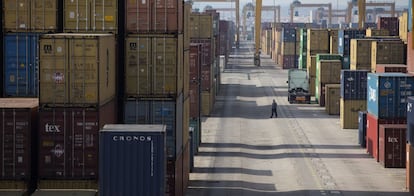Why bringing your non-EU goods into Spain can be a major headache
People buying from foreign websites are increasingly coming up against pricey tariffs

It all seems so easy when you’re on holiday somewhere exotic and the shop assistant tells you that the transport costs are all included in the price. Or when, sitting comfortably at home, you buy something online with a simple click of a mouse. But increasing numbers of Spaniards who buy goods from non-European Union countries – 12% of the population did so in 2015, up from 3% in 2009 – are finding out that that online bargain can turn into a nightmare of delays, red tape and extra costs that eventually leads some people to simply cut their losses and abandon their dream purchase in a customs depot.
In 2015, around 490,000 packages weighing a total of 183.7 million kilograms were abandoned by their owners
María, who prefers not to give her surname, has not yet thrown in the towel. In December, she paid €280 (shipping costs included) for a Japanese kimono that she wanted to sell in her vintage clothing shop in central Madrid. But not only is she still waiting to be able to pick it up from the capital’s Barajas Airport – where most overseas packages arrive in Spain – but has been told by customs that she will have to pay a further €148, a surcharge of 48%. “It’s a rip off,” she says.
Anybody buying goods from outside the European Union needs to do their research beforehand. They will have to pay 21% sales tax on anything worth more than €45, along with a 2.5% import tariff. Unless, of course, they’re importing a product that is specially protected by even higher taxes in Europe, such as a bike from China, Cambodia, Pakistan or the Philippines, in which case the tariff is 48%.
When do I have to pay sales tax and import duties in Spain?
1. Goods valued at less than €45 are exempt from sales tax and import duties.
2. Goods valued at up to €150, including shipping and insurance, are subject to 21% sales tax.
3. Goods valued at more than €150 are subject to sales tax and customs and import duties, which will depend on the type of goods.
The fight against fraud and piracy –14% of counterfeit brand products enter Europe by post and express deliveries – means that customs officers are increasingly asking importers for more paperwork, as well as simply opening packages on arrival to see what they contain. The Tax Agency, which runs the customs service, will not go into details, but says the origin of the goods, the route they have taken, and their value are all factors in deciding whether to hold on to certain items until the owner can be contacted.
Large items such as furniture or cars tend to be shipped by container, which although slower, is cheaper – providing all the paperwork is in order. “It’s the same story every day: the customer discovers that not all the shipping costs have been covered,” explains Luis Ripoll of the Valencia operation of shippers International Forwarding. “It tends to happen with cargo coming in from Asia, and businesses are caught out as often as individuals,” he adds.
The Tax Agency says the vast majority of imported goods eventually leave customs, but that when no agreement can be reached or the paperwork completed, they are either destroyed or put up for auction. In 2015, around 490,000 packages weighing a total of 183.7 million kilograms were abandoned by their owners.
María says she was told that she had just three days to pay the handling costs of her kimono being held at the Barajas warehouse operated by ADT Postales, the web platform authorized by the Correos postal service to look after these packages. She’s tried ringing, but nobody ever answers the phone or replies to her emails. “There is a complete lack of information and the slowness is exasperating,” she explains.

A Correos spokesman says the company is aware of the problems people buying goods from outside the EU face, and even admits that many of its own employees are not absolutely clear about the paperwork required sometimes. “We’ve even thought about preparing some kind of guidelines regarding the procedures for collecting packages,” he says.
Non-EU purchases may still be few in number, but they are creating an ever-larger headache, making up 22% of all complaints to the European Consumer Centre, almost twice the EU average.
Tu suscripción se está usando en otro dispositivo
¿Quieres añadir otro usuario a tu suscripción?
Si continúas leyendo en este dispositivo, no se podrá leer en el otro.
FlechaTu suscripción se está usando en otro dispositivo y solo puedes acceder a EL PAÍS desde un dispositivo a la vez.
Si quieres compartir tu cuenta, cambia tu suscripción a la modalidad Premium, así podrás añadir otro usuario. Cada uno accederá con su propia cuenta de email, lo que os permitirá personalizar vuestra experiencia en EL PAÍS.
¿Tienes una suscripción de empresa? Accede aquí para contratar más cuentas.
En el caso de no saber quién está usando tu cuenta, te recomendamos cambiar tu contraseña aquí.
Si decides continuar compartiendo tu cuenta, este mensaje se mostrará en tu dispositivo y en el de la otra persona que está usando tu cuenta de forma indefinida, afectando a tu experiencia de lectura. Puedes consultar aquí los términos y condiciones de la suscripción digital.








































